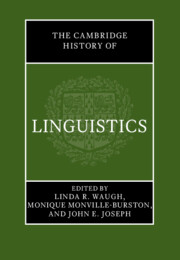Book contents
- The Cambridge History of Linguistics
- The Cambridge History of Linguistics
- Copyright page
- Dedication
- Contents
- Figures
- Tables
- Contributors
- Preface
- Acknowledgments
- Abbreviations, Acronyms, Special Symbols, and Other Conventions
- Introduction
- Part I Ancient, Classical, and Medieval Periods
- Part II Renaissance to Late Nineteenth Century
- Introduction to Part II The Cultural and Political Context of Language Studies from the Renaissance to the End of the Nineteenth Century
- 7 Universal Language Schemes
- 8 Locke and Reactions to Locke, 1700–1780
- 9 Rousseau to Kant
- 10 The Celebration of Linguistic Diversity: Humboldt’s Anthropological Linguistics
- 11 Early Nineteenth-Century Linguistics
- 12 The Neogrammarians and their Role in the Establishment of the Science of Linguistics
- Part III Late Nineteenth-through Twentieth-Century Linguistics
- Part IIIA Late Nineteenth Century through the 1950s: Synchrony, Autonomy, and Structuralism
- Part IIIB 1960–2000: Formalism, Cognitivism, Language Use and Function, Interdisciplinarity
- References
- Index
Introduction to Part II - The Cultural and Political Context of Language Studies from the Renaissance to the End of the Nineteenth Century
from Part II - Renaissance to Late Nineteenth Century
Published online by Cambridge University Press: 20 July 2023
- The Cambridge History of Linguistics
- The Cambridge History of Linguistics
- Copyright page
- Dedication
- Contents
- Figures
- Tables
- Contributors
- Preface
- Acknowledgments
- Abbreviations, Acronyms, Special Symbols, and Other Conventions
- Introduction
- Part I Ancient, Classical, and Medieval Periods
- Part II Renaissance to Late Nineteenth Century
- Introduction to Part II The Cultural and Political Context of Language Studies from the Renaissance to the End of the Nineteenth Century
- 7 Universal Language Schemes
- 8 Locke and Reactions to Locke, 1700–1780
- 9 Rousseau to Kant
- 10 The Celebration of Linguistic Diversity: Humboldt’s Anthropological Linguistics
- 11 Early Nineteenth-Century Linguistics
- 12 The Neogrammarians and their Role in the Establishment of the Science of Linguistics
- Part III Late Nineteenth-through Twentieth-Century Linguistics
- Part IIIA Late Nineteenth Century through the 1950s: Synchrony, Autonomy, and Structuralism
- Part IIIB 1960–2000: Formalism, Cognitivism, Language Use and Function, Interdisciplinarity
- References
- Index
Summary
From the fifteenth to the nineteenth century two mass-processes (related to politico-economic phenomena) transformed the conditions of communicative interaction and the study of languages in Europe: 1) gradual loss of universalism (decline of Latin) and disappearance of Latin-vernacular bilingualism; 2) standardization of the vernaculars by grammars and dictionaries (‘grammatisation’). ‘Exotic’ languages were described; Sanskrit — a unique phenomenon — became the basis of genealogical/typological classifications. From an epistemological perspective, language study, divided among the ‘arts’ of the trivium (grammar/logic/rhetoric), changed after the Renaissance, becoming part of the philosophy of mind (Port-Royal grammarians, Locke). To show the erosion of the borders of the three ‘arts’, the author analyzes two texts (by Lamy [seventeenth century] and Condillac [eighteenth century]) and concludes that both exemplify belief — common to ‘rationalism’ and ‘empiricism’ — in the interdependence between mental operations and grammatical forms. This resulted in a unified science of language. Comparative linguistics (nineteenth century.) led to a reflection on language history and scientific methods for gathering/verifying data: the eighteenth-century epistemological model imploded, cognitive linguistics became marginalized. However, some late nineteenth-century linguists aimed at elaborating a general linguistic theory, filling the gap between a cognitive foundation for linguistics and methods for comparing/classifying languages synchronically and diachronically: Steinthal, Paul, Bréal.
Keywords
- Type
- Chapter
- Information
- The Cambridge History of Linguistics , pp. 215 - 232Publisher: Cambridge University PressPrint publication year: 2023



